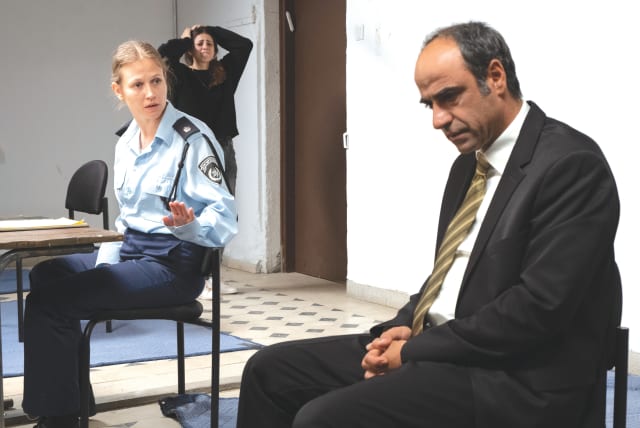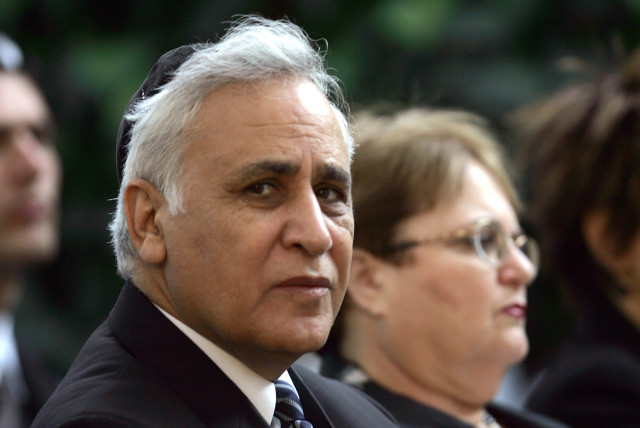Brilliant 'Unsilenced' unpacks the Katsav case - review

This series illustrates the twisted nature of sexual harassment and tells its story excellently.
His name is never mentioned, but Unsilenced, the new miniseries from Yes Studios, currently available on Yes VOD and STING TV, is about former president Moshe Katsav, who was convicted of raping and harassing members of his staff and served years in prison.
If you feel you know all you need or care to about Katsav and his crimes, I completely understand, and I shared that attitude, until I started watching the series. It’s so beautifully done that I ended up watching it all as quickly as I could, although, like any viewer in Israel, I knew the ending going in.
This series, more than any other work of fiction I’ve seen in the MeToo era, illustrates the twisted nature of sexual harassment and tells its story so brilliantly, that I think it has a shot at changing the mindset of holdouts who still can’t understand, for example, how a woman who was raped can continue working for the boss who has been attacking her.
In Hebrew, the series is called Aleph, after the first initial of the first victim to go to the police and is based on a novel by Odelia Karmon. It is a six-episode series with the first five concentrating on the points of view of different people connected to this story, The final episode is called, “We Are All Aleph,” and looks at the perspectives of multiple women.
The first Aleph of this series is Oshrat and the actress (Nelly Mira-Rubin) is excellent. I have seen Mira-Rubin in smaller roles in such series as Manayek and Fire Dance, and she has always given good performances, but her work in Unsilenced should make her into a star.
I kept having to remind myself that she was an actress playing a part, because it was hard to believe she was acting. Oshrat is just the kind of open, trusting person to whom predators like the president (Yaakov Zada-Daniel) are drawn. She has had various service and secretarial jobs, and lives with and cares for her ailing mother in the Kiryat Yovel neighborhood of Jerusalem, and for her, a career in the president’s office is a dream.
For the first time in her life, she is making good money, with the possibility of promotions and long-term work. The fact that the president is so nice to her is an unexpected plus. He takes a real interest in her and is friendly, informal and charming – as so many sexual predators can be at first.
By the time he gives her expensive earrings for her birthday, tells her he is in love with her and tries to kiss her, she is shocked, but she walks away. He pulls her back in with apologies and feigned contrition, and then begins raping her.
Mira-Rubin and the screenplay show the toll that the abuse takes on her. Eventually Oshrat, who seems bubbly and emotional but very levelheaded at the beginning, begins to fall apart. When she threatens to go to the police, the president expertly threatens her, telling her she and her mother will be out on the street and she won’t even be able to find work as a waitress. He even threatens to portray her as a prostitute to the media.
The plot thickens
IT ISN’T Oshrat who goes to the police, but the president himself, urged on by his smarmy but at times oddly likable chief of staff, Avinoam (Avraham Shalom Levi, one of the show’s creators). When Oshrat, breaking down, demands money for therapy from the president, Avinoam has convinced him to tape her and have the police threaten to charge her with blackmail.
This turns out to have been a miscalculation, as a Russian-born policewoman, Yana (Lena Fraifeld, who was so good in Valeria Is Getting Married), finds Oshrat credible and senses that the president’s story doesn’t add up. She doggedly pursues justice and doesn’t care who feels threatened by her investigation.
Avinoam is a central character, involved in every aspect of the president’s life, from silencing the women he has hurt to picking up cash payouts for preferential treatment for businessmen seeking tenders. Avinoam jokes that because he is from a Turkish family, he can pass for both Mizrahi and Ashkenazi, and manages the high echelons of government as well as the lowlifes expertly.
His playbook has always worked for him – until now. Avigail (Dana Meinrath), his on-again, off-again girlfriend who is the equally ambitious political advisor for another politician, is an important part of the story as well.
At the center, of course, is the president, who is played by Yaakov Zada-Daniel, the hardest working actor in Israel, who has appeared in everything from the television series, Fauda, Carthago and the upcoming Red Skies, to the dramatic movies, More Than I Deserve and Next to Her, to comedies like Kicking Out Shoshana.
He gives a wonderful performance in Unsilenced as a man who can turn from likable to vicious within the space of a minute, and you can see how he was able to manipulate the system all his life to advance from his humble beginnings to the presidency.
The entire cast, especially the women on the president’s staff, are all excellent, but one of the standouts here is Irit Nathan Benedek in the thankless role of Shula, the president’s wife. You can see the decades of humiliation weighing down on her in her smallest gestures and expressions. Shula’s tragedy, how she negates herself for the sake of a vile man, is one of the saddest plotlines.
The series opens with a disclaimer that it isn’t a documentary and that while it is based on fact – no one familiar with the actual case could doubt that – some of the events have been fictionalized.
The actual Aleph, now 47 and unafraid of revealing her true identity, Orly Revivo, has given interviews to the press discussing how her personality is very different from that of Oshrat in the series and that other facets of her experience differ from what is shown. But she does not deny the substance of the series. One way in which it differs from real life, not surprisingly, is that the story seems to unfold swiftly, while it took about three years between the time Aleph made her complaint to the beginning of the trial.
While the series will undoubtedly strike a chord in Israel, I think it will work well abroad, even for audiences who have never heard Katsav’s name: These cases tend to be disturbingly similar around the world.
Unsilenced, which was created by Tamar Marom, Moish Goldberg and Einat Zilber Damari, in addition to Avraham Shalom Levi, will stir up emotions connected to this distressing case, but at least the series also reminds us that, while the former president committed these crimes, he also received punishment. It wasn’t easy, but eventually, these women’s voices were heard and believed, and the system included not only powerful men trying to guard their privileges, but a policewoman like Yana who wouldn’t stop until the truth came out.
Jerusalem Post Store
`; document.getElementById("linkPremium").innerHTML = cont; var divWithLink = document.getElementById("premium-link"); if (divWithLink !== null && divWithLink !== 'undefined') { divWithLink.style.border = "solid 1px #cb0f3e"; divWithLink.style.textAlign = "center"; divWithLink.style.marginBottom = "15px"; divWithLink.style.marginTop = "15px"; divWithLink.style.width = "100%"; divWithLink.style.backgroundColor = "#122952"; divWithLink.style.color = "#ffffff"; divWithLink.style.lineHeight = "1.5"; } } (function (v, i) { });

